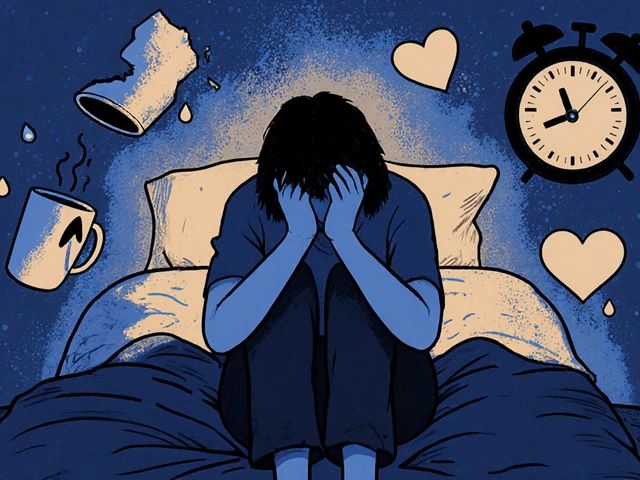Lurasidone and Alcohol: A Dangerous Combination?
Introduction: Understanding Lurasidone and Alcohol
Lurasidone is a medication commonly prescribed to treat mental health conditions such as schizophrenia and bipolar disorder. As with many medications, it's crucial to be aware of potential interactions and side effects that may occur when combining lurasidone with other substances, such as alcohol. In this article, we will delve into the dangers of mixing lurasidone and alcohol and discuss the reasons why this combination should be avoided. We will also cover alternative coping mechanisms and strategies for managing mental health without resorting to alcohol.
The Science Behind Lurasidone
Lurasidone belongs to a class of medications called atypical antipsychotics, which work by altering the levels of certain neurotransmitters in the brain, particularly dopamine and serotonin. These neurotransmitters play a crucial role in regulating mood and behavior, and by altering their levels, lurasidone can help alleviate the symptoms of mental health disorders such as hallucinations, delusions, and mood swings. As a result, patients prescribed lurasidone often experience an improvement in their overall mental health and well-being.
Alcohol's Effects on the Brain and Body
Alcohol, on the other hand, is a depressant that affects the central nervous system. It works by slowing down brain activity and impairing cognitive function, which can lead to feelings of relaxation, lowered inhibitions, and drowsiness. However, alcohol also has a range of negative effects on both mental and physical health, including impaired judgment, memory loss, and liver damage. Furthermore, excessive alcohol consumption can exacerbate existing mental health issues or even contribute to the development of new ones.
Dangers of Mixing Lurasidone and Alcohol
When lurasidone and alcohol are combined, several dangerous interactions can occur. Firstly, alcohol can interfere with the way lurasidone works in the brain, potentially reducing its effectiveness and worsening the symptoms it is intended to treat. Additionally, both lurasidone and alcohol can cause drowsiness and impair cognitive function, so combining the two substances can magnify these effects, leading to an increased risk of accidents and injuries.
Another concern is that alcohol can exacerbate some of the common side effects of lurasidone, such as dizziness, nausea, and drowsiness. This can make it difficult for individuals to function properly in their daily lives and may even lead to dangerous situations, such as falls or other accidents. Furthermore, the combination of lurasidone and alcohol can increase the risk of developing serious health issues, such as liver damage.
Managing Mental Health Without Alcohol
While it may be tempting to use alcohol as a coping mechanism for mental health issues, it is important to remember that this is not a healthy or sustainable solution. Instead, individuals should explore alternative, healthier coping strategies and seek professional help if needed. Some possible alternatives include therapy, support groups, exercise, and mindfulness practices, all of which can contribute to improved mental health and overall well-being.
For those who are prescribed lurasidone, it is essential to discuss any concerns or questions about the medication with a healthcare professional. They can provide guidance on how to manage potential side effects and offer advice on the best ways to cope with mental health issues without resorting to alcohol or other harmful substances.
Conclusion: Prioritizing Safety and Well-Being
In conclusion, the combination of lurasidone and alcohol can be dangerous and should be avoided. The potential interactions between these two substances can lead to worsened mental health symptoms, increased side effects, and a higher risk of accidents and injuries. Instead of using alcohol to cope with mental health issues, individuals should seek healthier alternatives and professional support to help manage their symptoms effectively and safely.





15 Comments
Jeremy Lysinger
May 12 2023Hey folks, just a quick reminder that mixing lurasidone with booze can really mess with the medication’s effectiveness, so steer clear and keep your mind sharp!
Nelson De Pena
May 21 2023It is essential to understand that alcohol may diminish the therapeutic benefits of lurasidone, potentially leading to heightened symptomatology and increased side‑effects. Maintaining sobriety while on this regimen is advisable for optimal outcomes.
Wilson Roberto
May 30 2023When we consider the interplay between pharmacology and personal habits, the ethical implications become profound. Lurasidone, by modulating dopamine and serotonin pathways, offers a delicate balance to those struggling with psychosis or mood disorders. Alcohol, a central nervous system depressant, indiscriminately dampens neural activity, often counteracting the precise biochemical adjustments intended by the medication. If one chooses to combine these agents, the resulting neurochemical chaos may manifest as increased sedation, impaired cognition, and a resurgence of psychotic features. Moreover, the synergistic drowsiness can jeopardize daily responsibilities, from driving to workplace performance. The risk of accidental injury escalates, especially when motor coordination is compromised. Liver health also warrants attention; both substances undergo hepatic metabolism, potentially overloading enzymatic pathways and precipitating hepatic strain. In the context of mental health, reliance on alcohol as a coping mechanism can mask underlying issues, delaying therapeutic progress. It is crucial to replace such habits with evidence‑based strategies: psychotherapy, structured exercise, and mindfulness practices. Social support networks provide accountability and reduce isolation, diminishing the lure of self‑medication. Clinical guidance remains paramount; clinicians can tailor treatment plans that acknowledge individual challenges while emphasizing safety. The psychological narrative surrounding medication adherence often involves fear of side‑effects, yet confronting these concerns openly can empower patients. By fostering transparent dialogues, we diminish stigma and promote informed decision‑making. Ultimately, safeguarding mental wellness requires holistic attention, where medication, lifestyle, and support intersect harmoniously.
Narasimha Murthy
June 9 2023While the article raises valid points, it arguably exaggerates the hazards without substantial empirical data. A formal critique would demand randomized controlled trials to substantiate the claim that alcohol systematically negates lurasidone efficacy. Nonetheless, caution is prudent.
Samantha Vondrum
June 18 2023Dear community, it is incumbent upon us to prioritize patient safety by avoiding alcohol while on lurasidone. 🙏 Proper adherence to treatment protocols ensures the best therapeutic trajectory. Should you experience discomfort, please consult your healthcare provider promptly. 🌟
Kelvin Egbuzie
June 28 2023Oh sure, the pharma giants want you to think the only danger is a little buzz, but they’re really hiding the fact that they’ve engineered lurasidone to be even more dangerous when you sip a beer. 🤔 Don’t be fooled.
Katherine Collins
July 7 2023i dont think i can drink while on meds.
Taylor Nation
July 17 2023Great point on the risks, and just to add, finding healthier outlets like a quick jog or a good playlist can really help keep the brain on track without resorting to booze.
Nathan S. Han
July 26 2023Listen up! The danger isn’t just a minor inconvenience-it’s a full‑blown showdown in your brain’s chemistry, and you don’t want to be the tragic hero in that story.
Ed Mahoney
August 5 2023yeah right, like everyone’s got time to read all that science junk. just don’t mess up your meds and you’ll be fine lol.
Brian Klepacki
August 14 2023Ah, the melodrama of pharmacology! One must not conflate the subtle art of mental health treatment with the crude theatrics of intoxication.
Shermaine Davis
August 24 2023Totally agree, it’s best to stick with the meds and maybe try a walk or talk to a friend instead of drinking.
Selina M
September 2 2023yeah, just keep it simple – no booze, stick to the plan, feel better.
tatiana anadrade paguay
September 12 2023It’s important to stay supportive and encourage healthier coping mechanisms, such as therapy or mindfulness, rather than relying on alcohol.
Nicholai Battistino
September 21 2023Thanks for the thorough overview; keeping medication routines intact is essential.